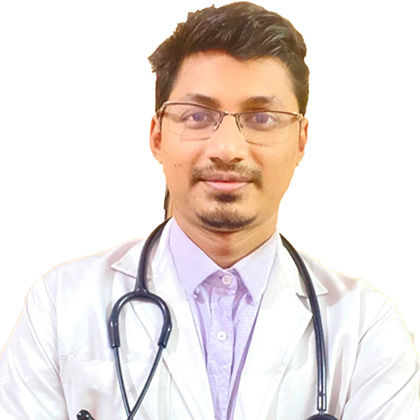How To Reduce Bloating Immediately?
Explore medically-backed strategies to alleviate bloating quickly. This blog provides insights on causes, immediate relief techniques, and expert recommendations for managing bloating effectively.

Written by Dr.Sonia Bhatt
Last updated on 3rd Jul, 2025

Bloating is a common condition characterized by abdominal fullness, discomfort, or visible swelling. While often not serious, it can disrupt daily life. Understanding its causes is key to managing the discomfort. In this article, we'll explore what causes bloating and how to relieve it effectively.
Bloating occurs when excess gas, fluid, or food accumulates in the digestive tract,causing discomfort sufficient or visible swelling. Bloating may occur in conjunction with symptoms such as pain and burping, and a feeling of tightness.
Several factors contribute to bloating, including:
Overeating, consuming certain foods (such as beans, dairy, and carbonated beverages)
Gastrointestinal disorders like irritable bowel syndrome (IBS) or gastroesophageal reflux disease (GERD).
Hormonal fluctuations
Stress
Food intolerances
Understanding these causes is key to effectively managing and reducing symptoms.
Quick Remedies for Bloating Relief
Bloating can be uncomfortable, but there are several quick remedies to help alleviate the discomfort. For relief from bloating, both prescription and over-the-counter drugs and natural remedies effective.
Over-the-counter (OTC) medications, such as:
Lactase supplements for those with lactose intolerance
Simethicone helps break up the bubbles in gas and may help gas pass through your digestive tract.
Activated charcoal
Antacids can also be useful for bloating caused by acid reflux
In addition, natural home remedies like:
Ginger
Herbal teas
Peppermint oil capsules
Fennel seeds
These can help relieve bloating by soothing the digestive tract, reducing gas, and promoting better digestion.
Dietary Changes to Minimise Bloating
Dietary changes can play a key role in preventing bloating. Certain foods contribute to excess gas and digestive discomfort while incorporating certain foods into your diet can help reduce bloating.
1. Foods to Avoid
Certain foods are known to contribute to excess gas and digestive discomfort. To reduce bloating, it's helpful to avoid foods such as:
Beans: Can produce excess gas and cause bloating due to their high fibre content.
Cruciferous vegetables: Foods like broccoli, cauliflower, and cabbage can be hard to digest and may lead to bloating.
Carbonated beverages: The bubbles in soda and sparkling water can trap gas in the digestive system, causing bloating.
Dairy products: For those who are lactose intolerant, milk, cheese, and other dairy items can cause bloating.
High-fat and fried foods: These foods slow digestion and may contribute to bloating by causing the stomach to empty more slowly.
2. Foods That Help Reduce Bloating
Foods that can aid in alleviating discomfort, improving gut health, and preventing excess internal gas buildup, includes:
Ginger: Known for its anti-inflammatory properties, ginger helps soothe the digestive tract and reduce bloating.
Peppermint: Helps relax the muscles of the digestive system, relieving gas and bloating.
Fennel seeds: help minimize gas and promote digestion.
Bananas: Rich in potassium, they help maintain electrolyte balance and reduce bloating.
Probiotic-rich yogurt: Supports healthy gut bacteria and improves digestion.
Lifestyle Adjustments for Immediate Bloating Relief
Lifestyle adjustments are important for the effective management and relief of bloating. Simple changes, such as regular exercise and proper hydration, can go a long way in reducing discomfort and supporting healthy digestion.
Regular exercise is very important for promoting healthy digestion and preventing constipation, which can contribute to bloating. Physical activity aids in moving gas through the digestive system, easing the discomfort.
In addition, maintaining adequate hydration is essential for minimizing bloating. Water helps facilitate digestion, reduces constipation, and flushes out excess sodium, which can cause water retention and bloating.
Through these few lifestyle changes, it could be hugely beneficial in curbing bloating and improving overall digestive health.
Effective Stretches and Exercises
Bloating can be a common discomfort caused by various factors like digestive issues, diet, or stress. Fortunately, certain yoga poses and stretches can help alleviate bloating by promoting better digestion, reducing gas buildup, and relaxing the body.
Following are some yoga poses that help relieve bloating:
Cat-Cow Pose (Marjaryasana-Bitilasana)- Stimulates digestion, relieves trapped gas and promotes spinal flexibility through gentle back movements.
Child's Pose (Balasana)- Calms the mind, stretches the back and abdomen, and relieves digestive tension.
Wind-Relieving Pose (Pavanamuktasana)- Directly targets the release of trapped gas, easing bloating and promoting digestion.
Seated Forward Fold (Paschimottanasana)- Massages abdominal organs, stretches the back, helps improve digestion, and relieves discomfort.
Supine Twist (Supta Matsyendrasana)- Gently massages digestive organs, reduces gas buildup, and improves circulation in the abdominal area.
Simple stretches can also be helpful in relieving discomfort. Following are some stretches that you can do at home:
Torso Twist: Sit or stand, gently twist your torso side to side to release gas and ease bloating.
Seated Side Stretch: Raise one arm overhead and lean to the opposite side to stretch and relieve abdominal pressure.
Knee to Chest Stretch: Lie on your back and pull one knee to your chest to help release trapped gas.
Forward Bend: Bend forward while seated or standing to ease abdominal discomfort and stimulate digestion.
Importance of Mindful Eating
Mindful eating is a powerful approach to improving digestion and reducing bloating. Being intentional about what, how, and when you eat can thus create a more operating digestive system and lessen discomfort.
Eating mindfully encourages slower eating, better digestion, and proper portion control, which can significantly minimize bloating. There are techniques for slowing down your eating pace and tips for monitoring portion sizes. Simple but effective habits can go a long way in combating overeating, reducing gas, and promoting general digestive health, which lessens bloating and contributes to your well-being.
Medical Evaluation and Treatment Option
Bloating is often temporary, while persistent or troublesome stomach bloating may indicate some underlying medical condition that should be addressed.
Persistent Bloating: If bloating lasts more than a few days despite dietary changes.
Severe Pain: Experiencing intense abdominal pain or discomfort.
Accompanying Symptoms: Presence of vomiting, weight loss, or changes in bowel habits.
No Relief: When home remedies or lifestyle changes fail to provide relief.
One should consult a doctor for advice if the bloating does not alleviate with simple lifestyle changes or home remedies or if other disturbing symptoms accompany it.
Medical Procedures for Persistent Bloating
There are some medical procedures that can help treat persistent bloating, such as:
Endoscopy: A procedure to examine the digestive tract for issues like ulcers or blockages.
Colonoscopy: Used to check for colon-related conditions like inflammation, tumours, or infections.
Barium X-ray: Helps identify structural problems in the digestive system.
Lactose Intolerance Test: Detects if lactose intolerance is causing bloating.
Additional Tips for Long-term Relief
As we delve deeper into the strategies for long-term relief from bloating, two crucial components stand out: diet and probiotics. Both play a vital role in maintaining a healthy digestive system and can significantly reduce the frequency and severity of bloating episodes.
1. Importance of a balanced diet
A balanced diet plays a crucial role in managing and reducing bloating by supporting proper digestion and gut health. It ensures your body receives the right nutrients, helping to maintain a healthy gut flora and digestive function.
2. Role of probiotics
Probiotics are helpful bacteria that help establish and maintain a healthy gut microbiome, support digestion, and reduce bloating. They help break down food more efficiently, prevent gas buildup, and alleviate discomfort caused by digestive disturbances. Incorporating probiotic-rich foods like yogurt, kefir, and fermented vegetables into your diet can improve gut health and reduce bloating.
Conclusion
Bloating, usually due to overeating, digestive problems, or food intolerance, can be treated in several ways. Relief comes immediately with over-the-counter medications, herbal remedies such as ginger or peppermint, and dietary modifications.Avoiding excessive eating, regular exercise, and proper hydration prevent bloating. On the other hand, repeated bloating or serious symptoms warrant a doctor's visit. A medical checkup with investigations such as endoscopy or colonoscopy might be required to look for underlying conditions. A probiotic diet helps maintain long-term digestion health, but professional consultation is important for chronic or unremitting bloating.
Consult Top General Physician
Consult Top General Physician
Dr. Sujay P R
General Physician/ Internal Medicine Specialist
3 Years • MBBS
Bengaluru
PRESTIGE SHANTHINIKETAN - SOCIETY CLINIC, Bengaluru
Dr. Paras Gangwal
General Physician/ Internal Medicine Specialist
28 Years • MBBS,MD General Medicine
Delhi
Dr Paras Gangwal Clinic, Delhi

Dr. Swagato Podder
General Practitioner
5 Years • MBBS
Kolkata
GRD POLYCLINIC, Kolkata

Dr. Santanu Mandal
General Physician/ Internal Medicine Specialist
17 Years • MD (Physician), DNB (General Medicine)
Kolkata
MCR SUPER SPECIALITY POLY CLINIC & PATHOLOGY, Kolkata
(25+ Patients)

Dr. Vishal Kumar H
General Physician/ Internal Medicine Specialist
8 Years • MBBS, master class in critical care medicine, Advanced Post Graduate Diploma in Non Invasive Cardiology, certificate course in Cardiovascular Disease & Stroke, Certificate course in Common Mental Disorder
Bengaluru
Apollo Clinic, Basavanagudi, Bengaluru



